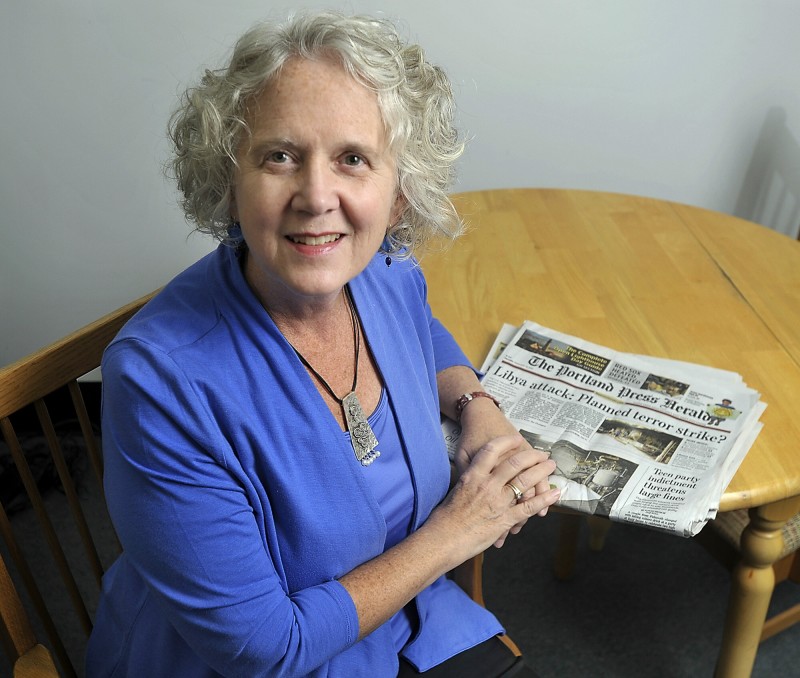When asked if he had any complaints about the Portland Press Herald, Roy Fairfield paused to think for a minute. He’s been reading the paper regularly for some 80 years and has had his own subscription for 62 years, so one might expect him to hand over a laundry list.
“The only criticism I can think of – and I kid you not – is that last week, the only mention of Thornton Academy’s win (in football) I could find was the score (and a three-sentence write-up),” said Fairfield, a Thornton alum and retired professor of American culture living in Biddeford. “I’m a sports fan, so that’s something I always look for.”
Fairfield was refering to Thornton’s 67 to 7 win over Gorham on Sept. 7. Being a big fan, he wanted to read a lot more about the lopsided victory than the brief game summary that made the next day’s paper.
Fairfield’s critique shows how passionate long-term subscribers are about what they expect in their daily Portland Press Herald and weekly Maine Sunday Telegram, and why it’s been so important to them for so long.
Fairfield grew up in Saco and got his news about the Great Depression from the Press Herald, which he brought with him to classes at Thornton Academy to use as part of current affairs reports. He moved away to teach at various colleges – Harvard, Ohio University, Bates College in Lewiston – but always came back for summers. So he’s kept up his subscription as well.
Today, at age 94, he still looks to the paper every day to find out what’s going on around the world, and around the corner. To find things that will enlighten, inform and entertain him.
“I don’t think it’s much different today, though it’s probably less political than when I was in high school,” said Fairfield, who researched 75 years’ worth of newspapers while doing his thesis work at Harvard. “I think newspapers are important, socially and politically.”
Maurice Whitten began subscribing to the Press Herald in 1955, when he moved into his current home in Gorham. He says the major changes in the paper he’s noticed over the years have to do with color. There was no color in the paper in 1955.
“‘Popeye’ was the big comic when I started reading the paper, and the comics were all black and white, but now we’ve got some color,” said Whitten, 88, a local historian who wrote the book “The Gunpowder Mills of Maine” and was a science teacher for many years. “What I like is the editorial page, and the letters. I like seeing a variety of opinions on things.”
For Grace Cleaves of Portland, subscribing to the Press Herald since 1975 has been a bit of a roller-coaster ride.
“I think the paper has waxed and waned over the years, as it responded to various economic pressures and has had to take care of its own house,” said Cleaves, who works as head of communications for Coastal Enterprises, a Maine-based nonprofit community development finance institution. “But right now, I’m seeing an uptick in reporter coverage. ”
For some longtime subscribers, life without the Press Herald on their doorstep is hard to imagine.
“I know there are a lot of people today who’ve given up the paper, modern times and all that, I guess. But gee, you can’t beat our paper,” said Leone Burrage, 88, a retired telephone company office worker living in Cape Elizabeth. “It’s changed an awful lot, but I can still find everything I want. There’s an awful lot of news about things that happen to people.”
Burrage, who has been subscribing since at least 1967, said her paper-reading routine starts with the “funnies.” She likes “Doonesbury” quite a bit, and has been following “Blondie” for years.
When Fairfield started subscribing in 1959, the idea of people getting news that is invisibly transmitted through the air and then displayed on an electronic screen seemed like something out of an H.G. Wells novel. But he understands that today’s newspapers are continually under pressure from new technologies.
He hopes that pressure doesn’t end up dramatically changing, or even ending, the newspaper as he’s known it.
“I worry about the decline of newspapers and the fact that some people don’t value them as much,” said Fairfield. “I just hope they don’t go away.”
Send questions/comments to the editors.




Comments are no longer available on this story